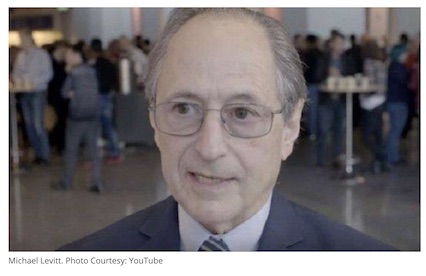Yahoo: Michael Levitt, a Nobel laureate and Stanford biophysicist, began analyzing the number of COVID-19 cases worldwide in January and correctly calculated that China would get through the worst of its coronavirus outbreak long before many health experts had predicted.
Now he foresees a similar outcome in the United States and the rest of the world.

While many epidemiologists are warning of months, or even years, of massive social disruption and millions of deaths, Levitt says the data simply don’t support such a dire scenario — especially in areas where reasonable social distancing measures are in place.
“What we need is to control the panic,” he said. In the grand scheme, “we’re going to be fine.”
Here’s what Levitt noticed in China: On Jan. 31, the country had 46 new deaths due to the novel coronavirus, compared with 42 new deaths the day before.
Although the number of daily deaths had increased, the rate of that increase had begun to ease off. In his view, the fact that new cases were being identified at a slower rate was more telling than the number of new cases itself. It was an early sign that the trajectory of the outbreak had shifted.
Think of the outbreak as a car racing down an open highway, he said. Although the car is still gaining speed, it’s not accelerating as rapidly as before.
“This suggests that the rate of increase in the number of deaths will slow down even more over the next week,” Levitt wrote in a report he sent to friends Feb. 1 that was widely shared on Chinese social media. And soon, he predicted, the number of deaths would be decreasing every day.
Three weeks later, Levitt told the China Daily News that the virus’ rate of growth had peaked. He predicted that the total number of confirmed COVID-19 cases in China would end up around 80,000, with about 3,250 deaths.
This forecast turned out to be remarkably accurate: As of March 16, China had counted a total of 80,298 cases and 3,245 deaths — in a nation of nearly 1.4 billion people where roughly 10 million die every year. The number of newly diagnosed patients has dropped to around 25 a day, with no cases of community spread reported since Wednesday. Keep reading

If his conclusions come from “analyzing the number of COVID-19” cases as reported by the Chi-Com lying propagandizing govt, then they are as reliable as…as…as Schmuckles the Clown’s statesmanship.
Sorry, but although he may be a smart guy he wasn’t very bright at picking trustworthy data.
Just last week, our hospitals were to be overrun with people gasping for air in just 8 days.
The only thing I’ve seen close to that is Chicago giving away free social inequality vacations at city hotels. Primarily because people continue to crowd the hospitals shooting each other.
Unless of course as AP Reporter ASTRID GALVAN (it’s time to name these pieces of shit) wrote that each of us will drink the fish cool aid because President Trump told us to (she reported that the couple who drank the fish cleaner were told to by Trump!).
What a piece of outright putrid rancid detestable human garbage this reporter (who has a history of bad immigration reporting) is.
A Nobel laureate? Why! He’s just as Science™! as Al Gore! So it MUST be true!
UV-B and C kills bacteria and viruses and produces B3 in the human body, when exposed.
Due to the sun’s angle during Winter months, less of it gets through the atmosphere, as well as, fewer people are exposed to maximum direct sunlight (around 11 AM to 1:00 PM) during cold weather (warm clothing, staying inside, etc.).
So, before every Autumn, think about boosting your B3 by adding B3 supplements.
Except for 2013, when I got the flu from NOT taking B3, have not had the flu since the last time I got a flu shot in 1999. Used to get it every year, or so, before then.
CHINA LIED, MILLIONS OF CHINESE DIED.
CORRECTION!
Not B3. But, D3.
In the hurry to beat the 5-minute Limit, Typo – BIG TIME!
pianamusic, I have also been advised the same thing, but it’s important to add K2, which aids the absorption of D3.
I don’t automatically trust experts, in any field, to know what they are talking about. Even the smarter ones that earn a bit of trust sometimes get it wrong. I go by an 80/20 rule. 80% of them only know what they’re talking about at most 20% of the time. The other 20% , the smarter ones, are only right about 80% of time. I haven’t yet decided which group this guy is in. If he’s in the smarter 20% , he still has a 20% probability of being wrong. The data he used seems untrustworthy, However, I hope he’s correct.
You can send hate mail to ASTRID GALVAN here:
https://www.dcourier.com/contact/